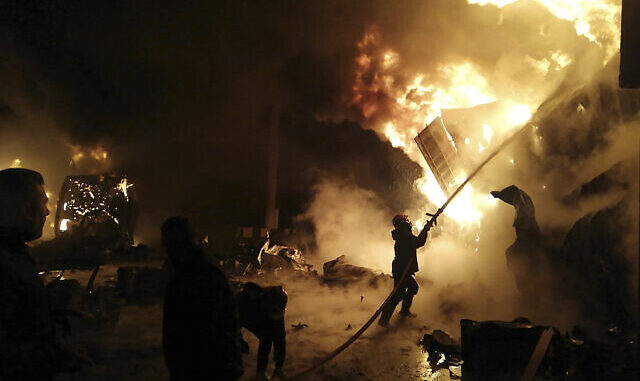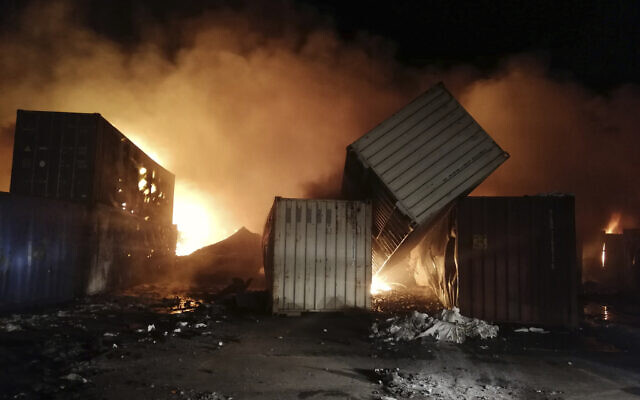Videos posted to social media show huge explosions and fires raging across the port, likely from secondary explosions of Iranian munitions, in second attack on facility this month
By JUDAH ARI GROSS and TOI STAFF DEC 28/21

In this photo released by the Syrian official news agency SANA, firefighters work at the scene of a missile attack, at the port of the coastal city of Latakia, Syria, Tuesday, Dec. 28, 2021. (SANA via AP)
Israeli warplanes fired a number of missiles at the port of the coastal city of Latakia early Tuesday morning, causing large explosions and fires, in the second alleged Israeli strike in a month on the key facility.
For years, Israel avoided conducting strikes against the Latakia port due to the large presence of Russian forces nearby, despite Iran allegedly using the terminal to transport advanced munitions through it to its proxies in the region, notably the Lebanese Hezbollah terror group.
SANA, Syria’s state media, quoted an unnamed military official as saying that several missiles struck the container area in the port, setting some of them on fire. He said the strikes caused “massive material damage.”
The Israel Defense Forces did not comment on the Syrian claims, as a matter of policy.
Videos posted to social media showed huge explosions and fires raging across the port, some of them apparently caused by secondary blasts from the missiles causing Iranian munitions to detonate.
According to SANA, the missiles came from the direction of the Mediterranean.
The Syrian military official said efforts were still underway to put out fires and assess the damage. There were no immediate reports of casualties in the attack, which activated Syrian air defenses, according to SANA.
Syria’s state-run al-Ikhbariyah TV ran footage showing flames and smoke rising from the terminal. It reported damage to nearby residential buildings, a hospital, shops and some tourist sites near the port.
An al-Ikhbariyah TV reporter in the area said the attack appeared to have been larger than the strike earlier this month and the explosions could be heard in Tartus, another coastal city more than 80 kilometers (nearly 50 miles) away.
Until earlier this month, strikes on the port of Latakia were highly irregular. The port is a vital facility where much of Syria’s imports are brought into the war-torn country and through which Iran reportedly brings in weapons and other equipment to its militias.
Though Israel has regularly conducted raids against Iranian-linked targets in Syria, it rarely strikes close to Latakia, let alone inside the terminal, as the Russian military maintains a base of operations nearby. Due to its delicate relationship with Moscow, Israel typically refrains from carrying out attacks against targets if there are Russian troops nearby, though Israel believes that this well-known policy has led Iran to seek to protect its arms transfers by conducting them near Russian-controlled areas.
Before this month, the previous time that Israel reportedly conducted a strike on a target in the city of Latakia — though not in the port — was in 2018, during which a Russian spy plane was accidentally shot down by Syrian air defenses, causing a major confrontation between Jerusalem and Moscow. Israel has also reportedly carried out raids against targets in the port city in 2014 and twice in 2013.
Israel has staged hundreds of strikes on targets inside government-controlled Syria over the years but rarely acknowledges or discusses such operations. Many of the strikes in the past had targeted the main airport in the capital Damascus, through which Iran is also believed to transfer advanced arms to its proxies.
Israel has acknowledged, however, that it targets the bases of Iranian forces and Iran-allied terror groups, particularly along the Golan border, such as Lebanon’s Hezbollah that has fighters deployed in southern Syria. It says it also attacks arms shipments believed to be bound for the groups.
Hezbollah is fighting on the side of Syrian President Bashar Assad’s forces in the decade-old civil war.

In this photo released by the Syrian official news agency SANA, flames rise from containers at the scene of a missile attack, at the port of the coastal city of Latakia, Syria, early Tuesday, Dec. 28, 2021. (SANA via AP)
Hours after Syrian media accused Israel of striking the port city of Latakia earlier this month, Prime Minister Naftali Bennett alluded to the incident, saying that the military was constantly fighting “bad forces” in the Middle East.
“We’re pushing back on the bad forces of this region day and night,” he said in English. “We won’t stop for one second. This happens almost daily.”
“In the face of destructive forces we will continue to act, we will be persistent, and we will not tire,” Bennett pledged.
AP contributed to this report



I wonder if Bennett has managed to make some sort of deal with Putin during his recent trip to Russia to confer with him, and obtained his permission to destroy certain weapons in the Latakia port. Its difficult to find another explanation for why Israel was bold enough to strike at the port after having failed to do this since the 2018 incident. If so, it is a legitimate accomplishment of the Bennett government. He must have got even Ganz abord with the decision. Getting Ganz to go along may have been harder than getting Putin’s consent.
Russians do not want Iranians and their allies strengthening their position in Syria. I would not be surprised if the Russians are feeding the Israelis intelligence on weapons systems that need to be destroyed.
The Russians would prefer the Israelis do the dirty work. Also since the Israelis might do it anyway, if it is coordinated then the Russians will know which areas that are about to be blown up and avoid them.